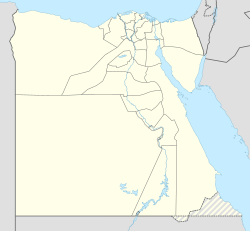Tomb
The tomb was originally made for a courtier from the time of Amenhotep III during the 18th Dynasty. In the hall there is still a scene with the original owner appearing before Amenhotep III and the goddesses Hathor. Another scene shows the original owner and his wife with squatting divinities before Amenhotep III and Maat in a kiosk. Prostrate Syrians are depicted on the base of the kiosk. [1]
The tomb was usurped during the 19th or 20th Dynasty by a man named Amenemonet and his father Amenhotep. [1]
Amenemonet (the son) is a scribe of the Sacred Offerings of Amun, Temple Scribe of Mut, and Scribe in the Temple of Ramesses II, "Beloved like Amun". Amenemone is accompanied by his wife Henutanensu. Amenemone's father Amenhotep was an Overseer of the prophets of Amun. [2]
The hall of the tomb is decorated with scenes from the Book of Gates and the Book of the Dead. One of the texts mentions King Ramesses I. [1] A scene from the tomb, now in the Cairo museum (JE 43591) depicts Amenemonet before the sacred bark of Amun. Amenemonet is shown accompanying the Vizier Paser. [3]
This page is based on this
Wikipedia article Text is available under the
CC BY-SA 4.0 license; additional terms may apply.
Images, videos and audio are available under their respective licenses.

